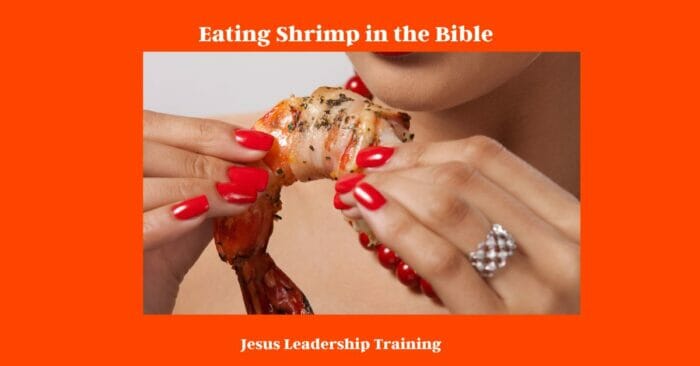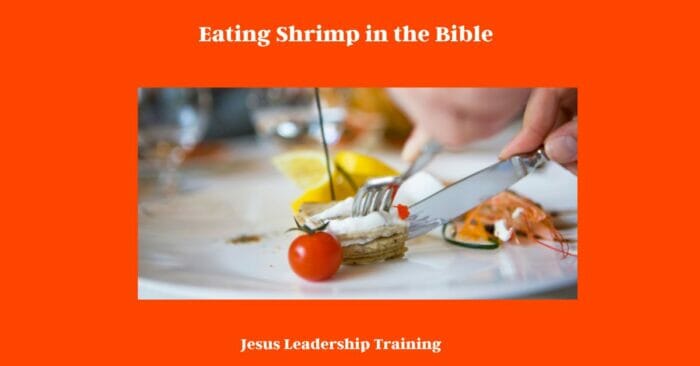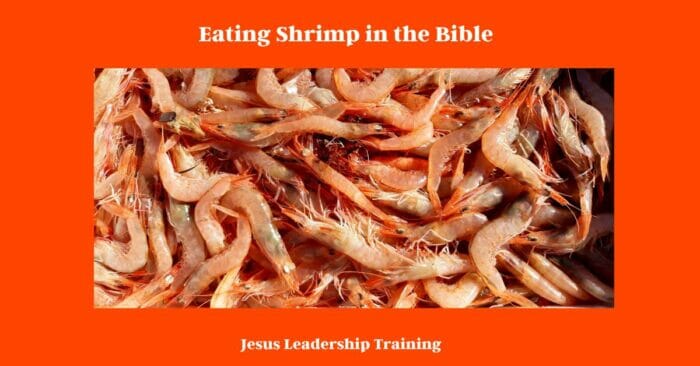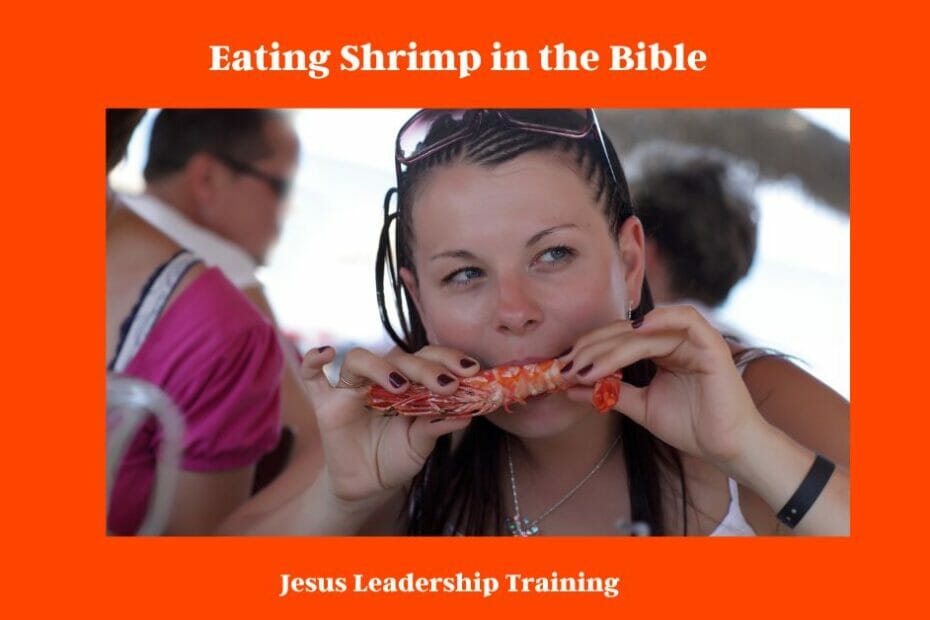Eating Shrimp in the Bible – Did you know that shrimp is not mentioned in the Bible? In fact, they are one of the types of seafood that are specifically mentioned not to eat of in the scriptures. Let’s take a look at what the Bible has to say about shrimp. We will look at it Frome the Old Testament View and also the New Testament View.
Table of Contents
Eating Shrimp in the Bible
It is a common assumption that since the Bible was written thousands of years ago, people back then knew very little about the world around them. As a result, they made many errors in their writing. But this assumption is simply not true! In fact, the Bible is full of accurate information about all sorts of topics, including marine life. One example of this can be found in the references to shrimp throughout Scripture.
here’s a table providing both biblical and potential scientific reasons to avoid eating shrimp:
| Reasons to Avoid Eating Shrimp | Biblical Basis | Scientific Basis |
|---|---|---|
| Dietary Law | Leviticus 11:9-12 – In the Old Testament, sea creatures without fins or scales, like shrimp, are considered unclean and not suitable for consumption. | Allergies – Shellfish, including shrimp, are one of the most common food allergies, potentially causing severe reactions. |
| Symbolic Impurity | In the Bible, creatures categorized as unclean might symbolically represent impure and sinful behavior. | High Cholesterol – Shrimp is high in cholesterol, which could contribute to heart disease if consumed excessively. However, it’s important to note that dietary cholesterol is not as harmful as once believed. |
| Religious Observance | For religious Jews and some Christian sects, not eating shrimp is a part of observing biblical dietary laws. | Environmental Concerns – Shrimp farming often has a significant negative impact on the environment, including mangrove destruction and water pollution. |
| Ethical Considerations | Some interpretations of the Bible emphasize respect for animals and creation, which might extend to a critique of modern farming methods. | Antibiotic Use – Like many farmed animals, shrimp are often treated with antibiotics to prevent disease, contributing to the growing problem of antibiotic resistance. |
It’s important to note that the Bible’s dietary laws are interpreted differently among different Christian denominations and individuals. Many Christians believe that the New Testament, particularly Acts 10:9-16, lifts these dietary restrictions.
As for the scientific reasons, while there are potential health and environmental risks associated with consuming shrimp, these risks can often be mitigated by sourcing sustainably farmed or caught shrimp and by moderation in consumption. Always refer to trusted health authorities and personal medical professionals for dietary advice.
The first mention of shrimp in the Bible comes in Leviticus 11:9-12, (Old Testament Law) where God lists animals (living thing) that are clean and unclean for eating. Among the animals that are considered clean and fit for human consumption is shrimp! This is significant because it means that God Himself declared shrimp to be food for His people.
Bible Verses about Shrimp
- Lev 11:9-12
- Deut 14:9
- Lev 11:12
- Lev 11:10
- Lev 11: 1-47
- Romans 14:1-23
- Mark 7:18-19
- James 1:5-6

The Strange and Bizarre Law That Forbids Eating Shrimp
In the book of Leviticus, there are a lot of laws that seem strange to us today. For example, there is a law that forbids eating shrimp. Yes, that’s right, shrimp! Why in the world would God forbid His people from eating shrimp? Let’s take a closer look at this bizarre law and see if we can figure it out. (Ceremonial Law)
See Amazons Educational Resources on Eating Unclean and Clean Animals
With that in mind, let’s take a look at the specific law that forbids eating shrimp. This law is found in Leviticus 11:9-12. In these verses, God lists a number of animals that His people are not to eat. Included in this list are shrimp, crabs, and lobsters. So, why would God forbid His people from eating these particular animals?
They are forbidden using this Language:
- Swarming thing
- Unclean food
- Whatsoever hath fins were OK
- Dietary Laws
- Jewish Food Laws
- Listed in Dietary Restrictions
- Coming from water of the Seas
- Found in the Mosaic Law
- Law of Moses
- Jewish Tradition
- King James Version
Table detailing some of the food Restrictions Mentioned in the Old Testament
| Type of Food | Specific Examples | Reason for Prohibition |
|---|---|---|
| Land Animals | Pig, Camel, Hare, Hyrax | These animals are considered “unclean” because, while they may chew the cud, they do not have a divided hoof. |
| Sea Creatures | Shrimp, Crab, Lobster, Shellfish, Shark, Dolphin, Octopus, Squid, Eel | These water creatures are considered “unclean” because they do not have fins and scales. |
| Birds | Owl, Hawk, Vulture, Eagle, Raven, Bat | These birds are specifically listed as “unclean” without a reason given. |
| Insects | Most insects except for some types of locusts, crickets, and grasshoppers | Most insects are considered “unclean”, except for some that “hop” along the ground. |
| Reptiles/Amphibians | Lizards, Snakes, Frogs, Turtles, Alligators | These creatures are considered “unclean”. |
Please remember that these dietary laws are complex and nuanced, with different interpretations among Jewish communities. Some Jews may follow these dietary laws strictly, while others may not observe them at all. The specific observance of these laws can depend on factors such as religious denomination, personal belief, and cultural practice.
Well, one possibility is that God was simply trying to protect His people from harmful bacteria and other diseases that could be found in seafood. After all, in those days there was no such thing as refrigeration or other means of preserving seafood. As a result, seafood often went bad very quickly and was often teeming with harmful bacteria.
Another possibility is that God was trying to protect His people from being contaminated by pagan practices. In those days, many pagans worshipped idols in the form of sea creatures like crabs and lobsters. By prohibiting His people from eating these animals, God was protecting them from being contaminated by pagan practices.

Why did God Forbid Eating Shrimp in the Bible
There are a lot of things in the Bible that God commands us not to do. Some of these things, like murder, are pretty obvious. But other things, like eating shrimp, aren’t quite so clear. So why did God forbid eating shrimp in the Bible?
God’s commands regarding what we can and cannot eat are found in Leviticus 11. In this chapter, God lists a number of animals that are clean and unclean. Clean animals are those that can be eaten, while unclean animals are those that cannot be eaten. Among the animals that are considered unclean and therefore forbidden for consumption are shrimp.
So why did God forbid eating shrimp? We don’t know for sure, but there are a few possible explanations.
First, it’s possible that God forbade eating shrimp because they were considered diseased or otherwise unhealthy. This is based on the fact that in Leviticus 11:22, God says that we are to make a distinction between clean and unclean animals so that we don’t “become unclean through them.” This suggests that there was something about unclean animals that made them prone to disease or sickness.
Another possibility is that God forbade eating shrimp because they were considered detestable or disgusting. This is based on the fact that in Leviticus 11:10, God says that we are not to eat any detestable thing. It’s possible that God considered shrimp to be detestable because they were scavengers or otherwise considered to be low on the food chain.
Whatever the reason, we know from Scripture that God has commanded us not to eat shrimp. And while this may seem like a strange thing for God to forbid, we need to remember that He knows what is best for us and His commands always have our best interests at heart.
Where are Shrimp Found in the Holy Lands
Blog Introduction: In this article, we will be discussing shrimp and where they are found in the Holy Lands. Did you know that there are over 2,000 species of shrimp? They can be found in all sorts of places including brackish water, saltwater, and even cold water. Some species of shrimp even live in hot springs! The term “shrimp” is often used to refer to small seafood, but did you know that there are actually two types of shrimp: true shrimp and prawns?
Prawns are crustaceans that have a exoskeleton and five pairs of legs while true shrimp have an exoskeleton and only four pairs of legs. Now that we have learned a little bit about shrimp, let’s move on to where they can be found in the Holy Lands.
The inaugural mention of shrimp is inferred in Numbers 11:5 during Moses’ account of the Exodus when he says, “We remember the fish we ate in Egypt at no cost— also the cucumbers, melons, leeks, onions and garlic.” It is thought by some scholars that when Moses mentions “fish” he might actually be referring to shrimp since they were so plentiful in Ancient Egyptian Diet.
The second mention of shrimp is in Isaiah 23:18 which says,” her merchandise and her wages will provide for many generations.” This verse is talking about Tyre which was known for it’s abundance of seafood including shrimp. ” This verse is talking about how God will destroy Babylon and all the luxuries that it has to offer including “fish from the Nile…and slaves from Egypt.”Even though shrimp is not mentioned by name very often in the Bible, they were clearly a part of life in the Holy Lands.
Shrimp are a type of seafood that can be found all over the world including the Holy Lands. There are over 2,000 different species of shrimp and they come in all sorts of shapes and sizes. Even though they are not mentioned by name exactly in the Bible, they were clearly a part of life in the Holy Lands

List of What Religions currently are opposed to Eating Shrimp
Many people are not aware that there are religions that do not allow the eating of shrimp. These include
- Judaism
- Islam,
- Hinduism
- Jainism.
Muslims believe that shrimp is haraam, meaning forbidden. This is because shrimp is an animal that is scavenged from the sea and is considered to be impure. Hindus and Jains also consider shrimp to be impure because it is an animal that lives in the bottom of the ocean and feeds on garbage. For these reasons, followers of these religions do not eat shrimp.
What was Jesus Teaching on Eating Unclean vs Clean (New Testament Passages) ( Christians eat shrimp)
When it comes to clean and unclean foods, there are a lot of misconceptions out there. Some people think that the food we eat doesn’t matter, while others think that all food is unclean. So, what did Jesus actually teach on this topic? Let’s take a look at what the Bible has to say.
In Mark 7:14-23, we see Jesus teaching on the topic of clean and unclean foods. He starts off by saying that it’s not what goes into our bodies that makes us unclean, but rather it’s what comes out of our hearts. This is an important distinction to make because it means that our hearts are what matter most to God, not the food we eat.
Jesus goes on to say that it’s not what we eat that defiles us, but rather it’s what we say and do that can make us unclean. This is an important point to consider because our actions have a much greater impact on our lives than the food we consume.
Finally, Jesus teaches us that it’s not about following the letter of the law when it comes to food, but rather it’s about having a heart that is pure and free from sin. This is an important lesson for us all to learn because often times we can get caught up in trying to follow the rules instead of focusing on our relationship with God.
When it comes to clean and unclean foods, there is a lot of confusion out there. But when we take a look at what Jesus actually taught on the topic, we see that it’s not about the food we eat, but rather it’s about our hearts. It’s not about following the letter of the law, but rather it’s about having a heart that is pure and free from sin. This is an important lesson for us all to learn as we seek to follow God with our lives.
What are the Health Benefits of Eating Shrimp (Shellfish)
Shrimp are a healthy and delicious seafood option that can be enjoyed by people of all ages. shrimp are a good source of protein and omega-3 fatty acids, which are two nutrients that are essential for good health. This blog post will provide an overview of the health benefits of eating shrimp.
Protein is an important nutrient for all stages of life. It is necessary for growth and development in children, and it helps to maintain muscle mass as we age. shrimp are a good source of protein, with each serving providing about 18 grams. This makes shrimp an excellent choice for those who are looking to increase their protein intake.
Omega-3 fatty acids are another nutrient that is essential for good health. These fatty acids have been shown to help reduce inflammation, lower blood pressure, and improve heart health. shrimp are a good source of omega-3 fatty acids, with each serving providing about 1 gram. This makes shrimp an excellent choice for those who are looking to increase their omega-3 intake.
The health benefits of eating shrimp are numerous. Shrimp are a good source of protein and omega-3 fatty acids, two nutrients that are essential for good health.
Nutrient Levels of Shrimp
Shrimp provides many health benefits due to its nutrient content. It is a good source of protein, vitamin D, and omega-3 fatty acids. Protein is essential for the growth and maintenance of all bodily tissues, including muscle. Vitamin D is necessary for the absorption of calcium, which is needed for strong bones. Omega-3 fatty acids help to reduce inflammation throughout the body, making them beneficial for conditions such as arthritis and asthma. In addition to these nutrients, shrimp also contains Selenium, which is important for thyroid function, and Copper, which helps to produce energy in cells. overall, shrimp is a nutritious food that can provide numerous health benefits.
What are the Negative Health problems associated with of Eating Shrimp
: It is no secret that seafood, and shrimp in particular, are a staple in many people’s diets. What you may not know, however, is that there are some negative health problems associated with eating shrimp.
One of the most well-known negative health problems associated with eating shrimp is the risk of food poisoning. Shrimp can be contaminated with harmful bacteria, such as E. coli, which can cause severe illness. Symptoms of E. coli food poisoning include vomiting, diarrhea, and abdominal cramps. In severe cases, kidney failure and death may occur.
Another potential health risk associated with eating shrimp is exposure to toxic chemicals. Shrimp may be exposed to toxic chemicals, such as pesticides and herbicides, during their lifetimes. These chemicals can accumulate in the shrimp’s muscle tissue and may be present in shrimp that is sold for human consumption. Consumption of toxic chemicals can lead to a variety of health problems, including cancers, reproductive problems, infectious disease, and organ damage.
Finally, some people may be allergic to shrimp. While not as common as other food allergies, an allergy to shrimp can be serious and even life-threatening. Symptoms of a shrimp allergy include hives, swelling of the lips and throat, difficulty breathing, and dizziness or lightheadedness. If you experience these symptoms after eating shrimp, seek medical help immediately.
While seafood provides many nutrients that are essential to good health, there are also some risks associated with consuming seafood products like shrimp. These risks include food poisoning, exposure to toxic chemicals, and allergic reactions. Before including seafood in your diet, it is important to weigh the risks and benefits to determine if the benefits outweigh the risks in your particular case.
Pesticide Levels in Shrimp
Pesticides are chemicals used to kill or repel pests. Pests can include insects, rodents, fungi, and weeds. Pesticides are used in agriculture, home gardens, and public parks. Pesticides can be applied to crops, soil, or water. They can be sprayed from planes, helicopters, or ground vehicles.
Pesticides can also be applied directly to people’s skin or clothing.Pesticide levels in shrimp vary depending on the species of shrimp and the type of pesticide used. Some shrimp have higher levels of pesticides than others. For example, farmed shrimp from Vietnam often have high levels of pesticides. Shrimp from other countries may have lower levels of pesticides. The type of pesticide used also affects the level of pesticide in shrimp.
Organophosphate pesticides are often used in shrimp farming. These pesticides can be highly toxic to humans. Carbamate pesticides are less toxic to humans but can still be harmful if eaten in large quantities. Shrimp with high levels of pesticide may not be safe to eat.
Pregnant women and young children should avoid eating shrimp with high levels of pesticide. Shrimp with low levels of pesticide are safe to eat for most people. When buying shrimp, look for shrimp that has been tested for pesticide residue. You can also ask your local fishmonger about the pesticide level in shrimp from your area.
What Peter’s Vision of Clean and Unclean Animals Teaches Us
The book of Acts tells the story of the early days of Christianity, after Jesus’ ascension into heaven. In chapter 10, we see an event that takes place in the city of Joppa. Peter, one of Jesus’ disciples, has a vision in which he sees a large sheet coming down from heaven. On the sheet are all sorts of animals, both clean and unclean according to Jewish law. A voice tells Peter to kill and eat, but he refuses because he is a Jew and knows that eating unclean animals is against the law.
What does this vision mean? Some believe that it was simply a way for God to show Peter that Gentiles (non-Jews) are now included in God’s plan of salvation. Others believe that it was a sign that the old ceremonial laws regarding food were no longer in effect. In either case, we can see that God was teaching Peter (and us) an important lesson about breaking down barriers between people.
In Jewish culture, there were strict rules about what could and could not be eaten. Certain foods were considered unclean and were therefore off-limits. These rules created social barriers between Jews and Gentiles because Jews would not eat with Gentiles or even share food with them. But in his vision, God shows Peter that these barriers are no longer in place. We are all now welcome at God’s table, regardless of our background or beliefs.
What can we learn from Peter’s vision? First, that we are all welcome in God’s family. Second, that we should be willing to break down the barriers that separate us from others. When we do, we will find that we have more in common with them than we ever thought possible.
Other Related Tags
- these shall ye eat of all that are in the waters
- the bible does not specifically mention shrimp
- you shall regard them as detestable
- you may eat of all living things
- new testament focuses on the heart
- lord thy god teaches what is good for man
- thou shalt eat of everything except the tree of good and evil
- thy god hath made
Is it a Sin to eat Shrimp
| Shrimp in the Bible | Explanation |
|---|---|
| Leviticus 11:9-12 | In the Old Testament, the book of Leviticus contains dietary laws given by God to the Israelites. According to these laws, certain sea creatures, including shrimp, were considered unclean and forbidden to eat. The passage specifically mentions that any sea creature lacking fins and scales is not to be consumed. Since shrimp do not have fins and scales, they are considered unclean according to these laws. |
| Mark 7:14-19 | In the New Testament, Jesus addresses dietary laws and declares that it is not what enters a person’s mouth that defiles them, but what comes out of their heart. He emphasizes that external factors like food do not affect one’s spiritual purity. This teaching indicates that dietary restrictions, including those regarding shrimp, are not considered sinful in the context of Christianity. |
| Acts 10:9-16 | In the book of Acts, the Apostle Peter receives a vision from God in which he sees a sheet containing various unclean animals, including shrimp. A voice tells him to kill and eat, but Peter objects, citing the dietary laws of the Old Testament. God responds by saying, “Do not call anything impure that God has made clean.” This vision is interpreted as a symbol of the inclusion of the Gentiles into the Christian faith and the abolition of the dietary laws of the Old Testament, including those related to shrimp. |
In summary, according to the Old Testament dietary laws, eating shrimp was considered a sin as it fell under the category of unclean animals. However, in the New Testament, Jesus’ teachings and the vision received by Peter in Acts 10 indicate that dietary restrictions, including those regarding shrimp, are no longer binding for Christians. Eating shrimp is no longer considered sinful in Christianity, and followers are not under obligation to observe the dietary laws of the Old Testament.
Final Thoughts – Eating of Shrimp in the Bible
There are many things in the Bible that are not specifically mentioned but are implied. For example, while the word “shrimp” is not specifically mentioned, it is clear from the biblical context that shrimp were part of the excluded diet of ancient Israelites. We know this because shrimp are classified as shellfish, and the Bible specifically mentions that shellfish are not acceptable food for God’s people (Leviticus 11:9-12).
Today you can choose whether for Health Reasons not to eat shrimp, or you can choose, Jesus set no restrictions except for causing a brother to stumble. Under the New, Covenant Shrimp are Living Creatures. We are not to pass Judgment on God’s People if they choose to follow Jewish laws, or in Following Jesus Christ knowing that the Old Testament was a shadow of the things to come. In Peter’s Vision God Removed the Biblical prohibition when the Lord spake to Peter – Eating Shrimp in the Bible – Is it a Sin to eat Shrimp
God Bless Greg




